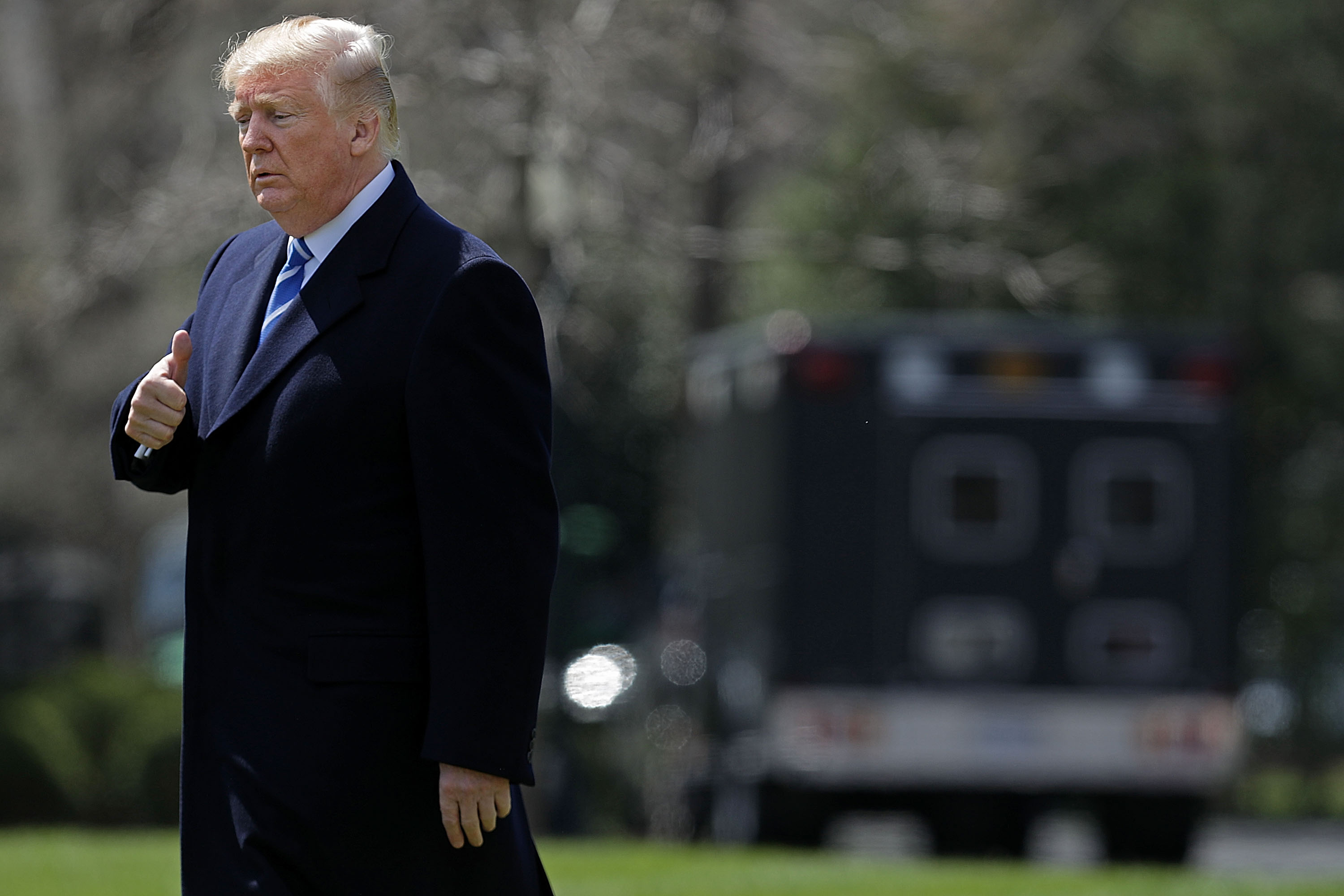Trump's Syrian whiplash
How can the president lurch from recommending a precipitous withdrawal from Syria to, as seems likely, ordering another military strike on Assad?


On Saturday, the genocidal government of Syrian President Bashar al-Assad once again murdered its own citizens with chemical weapons, in a gruesome attack on the rebel-held suburb of Douma. Dozens of innocent civilians were killed, in nightmarish and unforgettable ways that should disturb anyone with a conscience. But the likely U.S. response — some sort of temporary Tomahawk missile barrage — will accomplish little other than confirming that serious people in Washington still believe that you can send a message of resolve with some guided missiles. The only thing recipients will hear is that Washington remains painfully confused about what it wants in Syria.
President Trump responded to the attacks not with a carefully prepared speech or quiet, behind-the-scenes diplomacy, but rather with one of his loopy, name-calling tweets. On Sunday, he banged out the following: "If President Obama had crossed his stated Red Line In The Sand, the Syrian disaster would have ended long ago! Animal Assad would have been history!" Like most everything that escapes the president's mouth, his statement was both disingenuous and absurd. Even had the Obama administration gone through with what would had been a significant and broad planned strike against Assad's assets in 2013, it would not have ended the war, nor would it have toppled the regime absent a massive U.S. military mobilization that the voting public didn't want and would not have stood for.
The president's revisionist history is one problem. The other is that everything the Trump administration has done since coming into office has seemed explicitly designed to keep Assad in power. The United States has almost completely withdrawn itself from peacemaking efforts, ceding the initiative, the narrative, and the ultimate terms of the settlement to Moscow and the so-called Astana Process it is executing along with its junior partners in Istanbul and Tehran. If the understaffed, graveyard-shift Trump foreign policy team has any issues with this outcome, it certainly has not made much noise about them yet. It may very well be the only feasible path to stopping the bloodshed.
The Week
Escape your echo chamber. Get the facts behind the news, plus analysis from multiple perspectives.

Sign up for The Week's Free Newsletters
From our morning news briefing to a weekly Good News Newsletter, get the best of The Week delivered directly to your inbox.
From our morning news briefing to a weekly Good News Newsletter, get the best of The Week delivered directly to your inbox.
The Trump administration has also tacitly admitted, time and again, that its options in Syria aren't much different than those ultimately contemplated and decided upon by the president's predecessor. Trump's brief and limited airstrikes last year in response to another chemical weapons attack illustrated the total emptiness of Obama's foreign policy critics. Remember, according to hawkish opponents, it was Obama's refusal to enforce the administration's chemical weapons "red line" in 2013 that apparently invited Putin's aggression and Assad's escalation of the conflict. Yet here we are, a year after the U.S. did what all of the military scolds had been telling it to do all along, with the Assad regime still apparently unafraid of using chemical weapons.
Some of these same interventionists were out in force this weekend, including Sen. John McCain (R-Ariz.), who claimed that Assad had been "emboldened by American inaction." But by now it should be clear that the opposite is true — Trump's feeble airstrikes last April achieved nothing, just like President Clinton's halfhearted Tomahawk attacks on Afghanistan and Sudan in the aftermath of the 1998 embassy bombings in Kenya and Tanzania. If the president risks a broader crisis with Russia by launching additional assaults this week, they will, similarly, achieve little of substance. America plainly lacks the will and the resources to challenge the Assad government's alliance with Iran and Russia or its position in the civil war. Instead, the best we can do is ensure that our allies on the ground get the most they can out of any possible settlement.
What that settlement will look like should be the focus of American efforts. But America's diplomatic corps is hobbled by former Secretary of State Rex Tillerson's malign neglect, and the rudderlessness at state and the lack of strategic thinking from the White House have left the U.S. adrift and incapable of capitalizing in any way on the successful, administration-spanning effort to roll back ISIS. "What do we do now?" is a question that that the Trump team does not seem to have seriously entertained. And now we have to brace for the kind of abrupt shift in policy that might be recommended by the president's new foreign policy doyen, national security adviser John Bolton, or foisted on him by the inexorable pressure to respond to Assad's provocation.
Whatever the president's new court fabulist has to say, the important thing to keep in mind above all else is this: America doesn't have a Syria policy. It has rhetorical aspirations that bear no relationship whatsoever to the actual price that the American people are willing to pay for them. It has a foreign policy community whose faith in the ability of U.S. military power to transform other societies is unbroken by the past 30 years of foreign policy failure and blowback. And it has a president who therefore settled on exactly what the Obama administration did: a cold calculation that ISIS was the only genuine long-term threat to U.S national security. That's another reason why lobbing Tomahawks into Syria is particularly problematic — doing so will further confuse America's ambitions, its actual posture, and its rhetoric.
A free daily email with the biggest news stories of the day – and the best features from TheWeek.com
Late last week, the Trump administration was contemplating getting out of Syria altogether, withdrawing the 2,000 remaining American troops and, presumably declaring victory against ISIS. "Let the other people take care of it now," the president said. And of course, the regents of the forever war went crazy. Pulling out now would jeopardize hard-won progress, and allow ISIS forces to trickle back into the crevasses hollowed out by years of military victories, they said. We've got them right where we want them and please don't turn off the funding spigot. But how many times have we heard this story? The bad guys are always on the run. We're always one more troop escalation, one more year of dogged pursuit, one more spending increase away from triumph, one more reinforced ally or proxy from final victory. The goals remain elusive, as do the limitations. After 18 years, the American people deserve to know the truth about both.
How can the president lurch from recommending a precipitous withdrawal from Syria to, as seems likely this morning, ordering a military strike on an entity with which we are not even formally at war? It's simple: The United States is more lost in Syria than ever. After liquidating ISIS, does the U.S. want to challenge the new Moscow-led order in Syria or acquiesce to its preferred resolution? And despite the well-intentioned desire to condemn the Assad regime's barbaric behavior, giving in to the impulse for quick revenge is a mistake. Cruise missiles don't express condemnation. They express violence, and if they aren't backed by a much more serious plan, it will be still more violence without purpose.
David Faris is a professor of political science at Roosevelt University and the author of "It's Time to Fight Dirty: How Democrats Can Build a Lasting Majority in American Politics." He's a frequent contributor to Newsweek and Slate, and his work has appeared in The Washington Post, The New Republic and The Nation, among others.
-
 Biggest political break-ups and make-ups of 2025
Biggest political break-ups and make-ups of 2025The Explainer From Trump and Musk to the UK and the EU, Christmas wouldn’t be Christmas without a round-up of the year’s relationship drama
-
 Why 2025 was a pivotal year for AI
Why 2025 was a pivotal year for AITalking Point The ‘hype’ and ‘hopes’ around artificial intelligence are ‘like nothing the world has seen before’
-
 The best drama TV series of 2025
The best drama TV series of 2025the week recommends From the horrors of death to the hive-mind apocalypse, TV is far from out of great ideas
-
 How Bulgaria’s government fell amid mass protests
How Bulgaria’s government fell amid mass protestsThe Explainer The country’s prime minister resigned as part of the fallout
-
 Femicide: Italy’s newest crime
Femicide: Italy’s newest crimeThe Explainer Landmark law to criminalise murder of a woman as an ‘act of hatred’ or ‘subjugation’ but critics say Italy is still deeply patriarchal
-
 Brazil’s Bolsonaro behind bars after appeals run out
Brazil’s Bolsonaro behind bars after appeals run outSpeed Read He will serve 27 years in prison
-
 Americans traveling abroad face renewed criticism in the Trump era
Americans traveling abroad face renewed criticism in the Trump eraThe Explainer Some of Trump’s behavior has Americans being questioned
-
 Nigeria confused by Trump invasion threat
Nigeria confused by Trump invasion threatSpeed Read Trump has claimed the country is persecuting Christians
-
 Sanae Takaichi: Japan’s Iron Lady set to be the country’s first woman prime minister
Sanae Takaichi: Japan’s Iron Lady set to be the country’s first woman prime ministerIn the Spotlight Takaichi is a member of Japan’s conservative, nationalist Liberal Democratic Party
-
 Russia is ‘helping China’ prepare for an invasion of Taiwan
Russia is ‘helping China’ prepare for an invasion of TaiwanIn the Spotlight Russia is reportedly allowing China access to military training
-
 Interpol arrests hundreds in Africa-wide sextortion crackdown
Interpol arrests hundreds in Africa-wide sextortion crackdownIN THE SPOTLIGHT A series of stings disrupts major cybercrime operations as law enforcement estimates millions in losses from schemes designed to prey on lonely users
